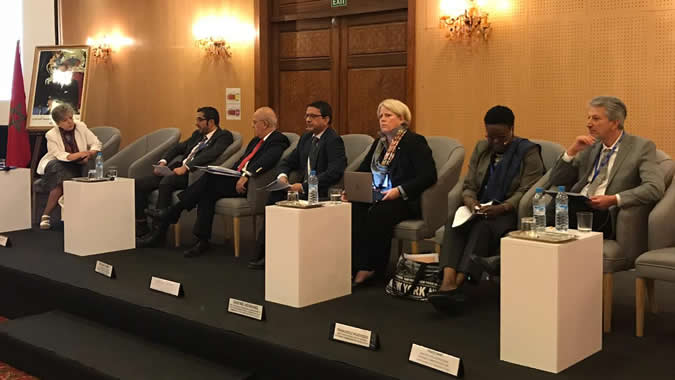News
The Global Compact for Safe, Orderly and Regular Migration provides a framework of non-binding shared principles so that countries can confront an issue that is inherently cross-border and which doesn’t affect their sovereignty, Alicia Bárcena, Executive Secretary of the Economic Commission for Latin America and the Caribbean (ECLAC), said today at the start of her participation in the Intergovernmental Conference to adopt the Global Compact for Migration, which is taking place in Marrakech, Morocco.
The United Nations regional commission’s most senior representative highlighted that integration and regional cooperation are critical to implementation of the agreement, which has garnered broad support from the region of Latin America and the Caribbean.
“This instrument arises as the international community’s response to the challenges and opportunities that migration poses on a global agenda. It is a historic instrument that constitutes an example of renewed multilateral interest,” she stated.
ECLAC’s Executive Secretary, in her capacity as representative of the five United Nations regional commissions, led the meeting entitled Regional Perspectives on the Global Compact for Safe, Orderly and Regular Migration, organized by the five UN regional commissions, which addressed the priorities, opportunities and challenges for the successful implementation of the global agreement at a regional level.
In addition to Alicia Bárcena, the event was inaugurated by Luis Alberto Castiglioni, the Minister of Foreign Affairs of Paraguay; Nasser Al Hamli, Minister of Human Resources and Emiratisation of the United Arab Emirates; and Nirmal Raj Kafle, Deputy Permanent Representative of Nepal to the United Nations and the World Trade Organization.
Other speakers included Mounir Tabet, Acting Executive Secretary of the Economic and Social Commission for Western Asia (ESCWA); Thokozile Ruzvidzo, Director of the Social Policy Division of the Economic Commission for Africa (ECA); Paulo Saad, Chief of the Latin American and Caribbean Demographic Center (CELADE)-Population Division of ECLAC; and Sabine Henning, Chief of the Sustainable Demographic Transition Section of the Social Development Division at the Economic and Social Commission for Asia and the Pacific (ESCAP).
During her presentation, ECLAC’s Executive Secretary underlined that the Global Compact for Migration fully recognizes the regional dimension’s importance for international migration, and she reaffirmed the UN regional commissions’ willingness to cooperate with the regional mechanisms for the implementation, follow-up and review of the global agreement.
“The United Nations’ regional economic commissions can contribute to understanding the root causes of migration, they can compile and produce data, provide methodologies and statistics to assess the magnitude of these movements of people, their age structure, their abilities, languages, health, nutrition and educational needs,” ECLAC’s top representative sustained.
She added that the regional organizations can also facilitate evidence-based analyses of the trends and policies related to regional migration, while providing, in collaboration with the International Organization for Migration (IOM), a platform for regional review and establishing dialogues between governments, the private sector, civil society and other stakeholders.
The senior United Nations official analyzed the case of Latin America and the Caribbean, a region in which nearly 30 million people live outside their countries of birth. Of those, approximately 17 million are Mexicans and Central Americans living in the United States.
She added that the region is conscious of the vulnerability and violence that many of its migrants suffer – particularly women and children – but at the same time recognizes the overwhelmingly positive social, economic and cultural impact of migration in both countries of origin and destination.
In the United States, for example, the population of Latino origin has played a key role in demographic reproduction and in the labor market. Calculations indicate that 38% of its workforce shortage between 2000 and 2015 was covered by Latin American immigrants, among whom Mexicans and Central Americans contributed more than 80%.
In her remarks, Alicia Bárcena affirmed that Latin American and Caribbean countries have contributed significantly to the debate on global migration, in particular to guarantee the incorporation of migrants’ human rights into all regional and global forums on migration.
They have also supported initiatives in favor of facilitating migration, such as MERCOSUR’s residence agreement, the instruments for free transit issued by the Andean Community of Nations, and some agreements on free movement approved by the Pacific Alliance, she indicated.
She also stressed the importance of the Montevideo Consensus on Population and Development of 2013, which defines a regional strategy for migratory governance founded on the protection of all migrant persons and includes concrete proposals for actions and indicators
She noted that, more recently, as a response to the problems of vulnerability affecting emigration, transit and return, Central American countries and Mexico are defining a comprehensive development plan that seeks to offer more opportunities to inhabitants in their countries of origin.
Earlier in the day, ECLAC’s Executive Secretary participated in the side event Regional Dimensions in the Implementation, Follow Up and Review of the Global Compact for Migration, organized by the United Arab Emirates, IOM and the Migrant Forum in Asia.
During that event, participants reflected on regional cooperation to help United Nations Member States in the implementation, follow-up and review of the Global Compact for Safe, Orderly and Regular Migration.
The event was inaugurated by Nasser Al Hamli, Minister of Human Resources and Emiratisation of the United Arab Emirates; Louise Arbour, Special Representative of the Secretary-General for International Migration; Antonio Vitorino, Director General of IOM; and Alicia Bárcena, ECLAC’s Executive Secretary.



